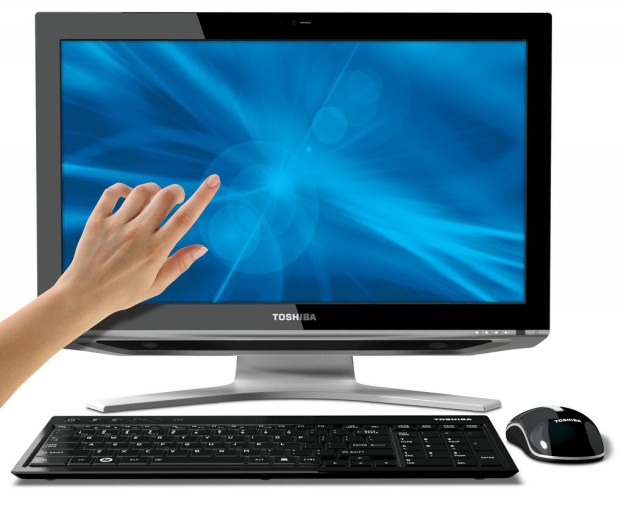
In the United States, Toshiba is mainly known for its stalwart line of notebooks computers, but now the company has chosen to zig instead of zag, launching the DX1215, it’s first all-in-one computer for the U.S. market. The DX1215 will feature a 21.5-inch 1080p touchscreen display, USB 3.0 connectivity, and will be powered by second-generation Intel Core i5 or Core i7 processors.
“Toshiba combined its experience with computing platforms and visual products to create an All-in-One that truly complements the living situations of our customers with a PC that offers high performance, premium features, and unique styling,” said Toshiba America Information Systems VP of product development Carl Pinto, in a statement.
Toshiba is positioning the DX1215 as both a general-purpose computer and an entertainment hub—especially in places like dens and dorm rooms where space might be at a premium. The 21/5-inch display supports full HD 1080p content and can be set at a variety of angles for either viewing or touch applications. The system also sports premium Onkyo audio, with the sound system features Waves MaxxAudio processors.
The DX12125 will sport a 1 TB 7200rpm hard drive for plenty of music and movie storage, two USB 3.0 ports, four USB 2.0 ports, and an integrated DVD±RW super multi drive—it doesn’t appear Blu-ray drives are available even as an option. Toshiba is also throwing in some proprietary technologies, including Sleep & Music (so users can play audio through the PC speakers when the unit is asleep), along with upscaling to improve the look of standard-resolution DVD content on the HD display. The unit will ship with a Bluetooth wireless keyboard and mouse, and Toshiba will also be offering an optional TV tuner.
Expect to see the DX1215 at Best Buy starting July 3, with prices starting at $929.99.
Editors' Recommendations
- Intel Core i5 vs. i7: Which CPU is right for you in 2023?
- Intel Arc Alchemist may be a lot cheaper than we thought
- AMD and Intel duke it out in the GPD Win Max 2, and there’s a clear winner


